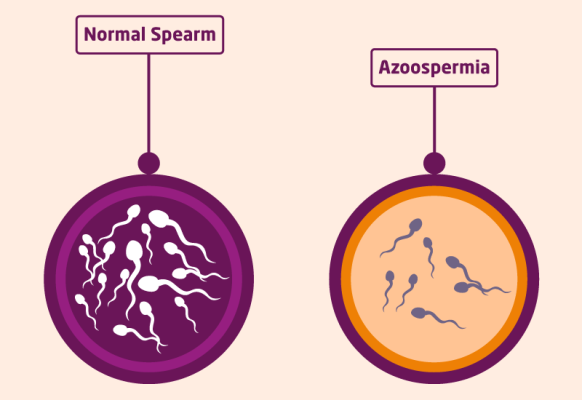What Is Azoospermia?
Martha has been married to her husband for the past 3 years but she has never conceived because her husband has no sperm.
Overview
You would never understand the pain that comes with childlessness if you haven’t had a first hand experience. After a wedding, the next thing everyone expects is the protruding belly of the woman signifying that a baby is on the way. If after a year, there is no sign of pregnancy, worry sets in. if it runs into years, the wife may even be tagged barren or be tagged a witch who has donated all the children in her womb in their coven. The pressure is usually on the woman especially in Africa. Sadly, not everyone is aware of the fact that infertility does not end with women alone. Men can also be infertile.
What Is Azoospermia?
The absence of sperm in the semen is known as azoospermia. It may not be something to worry about if you and your partner are not planning on having kids. This is a major cause of infertility in men. If you are suffering from azoospermia, worry not because you are not alone. Statistics have shown that about 2% of men have azoospermia and it’s believed to be the root cause of most infertility in some men. The testicles are where sperm is produced. It goes through the reproductive tract and combines with the seminal duct fluid to form semen. When the sperm is absent, then the man is considered to be suffering from azoospermia.

Types Of Azoospermia And Their Causes
There are three types of azoospermia:
Pre-testicular azoospermia: this is a non-obstructive type of azoospermia caused by genetic disorder, problems with the brain, radiation therapy for cancer or taking certain medications.
Testicular azoospermia: also a non obstructive type of azoospermia caused by abnormalities in the function or structure of the testicles and can occur as a result of the following:
- Klinefelter syndrome: a condition whereby a man is born with XXY chromosomes instead of XY.
- anorchia: the absence of testicles at birth
- Cryptorchidism: undescended testicles
- Sertoli cell-only syndrome (also referred to as germ cell aplasia or del Castillo syndrome): very low or no spermatogenesis
- Spermatogenic arrest: a condition whereby the testicles do not produce mature sperms.
Other causes include:
- tumors
- having the mumps in late puberty
- Diabetes
- Varicocele
- prior surgery
- reactions to certain medicines
Post-testicular azoospermia: This obstructive type of azoospermia is caused by an obstruction in the reproductive tract, a missing connection, in the epididymis or vas deferens tubes that move and store sperm, congenital conditions, injury, cysts, infections, or vasectomy.
What are the symptoms of azoospermia?
You might not really notice that you are suffering from azoospermia until all efforts to get your partner pregnant prove abortive. Visible symptoms of azoospermia may be due to an underlying health condition like hormone imbalances and genetic chromosomal abnormalities.
Possible Symptoms Of Azoospermia
- Low sexual urge
- erectile dysfunction (weak erection)
- Swelling, lump, or pain around the testes
- Hair loss on the face or body
How is azoospermia diagnosed?
A semen analysis is the most simple approach to determine if you have azoospermia. Your doctor will instruct you to ejaculate into a container and send the specimen to a laboratory for analysis. If no living sperm is found in the ejaculates, you may be suffering from azoospermia. You may also be requested to provide your medical history.
Other means of diagnosing azoospermia include blood tests, ultrasound, brain imaging, and biopsies.
Medical Treatments For Azoospermia?
Obstructive azoospermia: This can be treated by reconnecting the ducts that are preventing the sperm from flowing. This may be done through surgery or other procedures. Treating the underlying health condition may also help in the treatment.
Non-obstructive azoospermia: medical therapy may or may not be effective in the treatment of nonobstructive azoospermia. However, it is still possible to have a biological child through IVF (In Vitro Fertilization). If you want to go with this option, your doctor will educate you on the procedures and any genetic impact this may have on your child.
Natural Remedies For Azoospermia
There are certain verbs and diets that can be used in the treatment of low sperm count but not all can be used to treat azoospermia (no sperm count).
Here are natural remedies you may find helpful:
- Exercise regularly
- Eat healthy
- Your doctor may be able to prescribe verbs and supplements that boost male fertility like Coenzyme Q10, black seed, folic acid, horse chestnut, Panax ginseng, L-carnitine, and zinc.
- yoga or meditation to reduce your stress levels.
Our SPERM BOOSTER (with NAFDAC registration number A7-100283L) contains herbs that are well formulated to improve sperm quality and quantity. With lots of positive feedback from our various clients across the globe, you can be optimistic that our products, which are NAFDAC CERTIFIED, will give you the maximum desired result. To order, click here> Fekomi Sperm Booster
How To Prevent Azoospermia
Azoospermia that is caused by injury or certain medications can be prevented in the following ways:
- Limit your exposure to radioactivity.
- Avoid activities that may hurt your testes and reproductive system.
- Avoid saunas and steam baths which can expose your testes to too much heat.
Call in at Fekomi Wellness
Our caring team of Fekomi wellness experts can help you with your health concerns. Visit Fekomiwellness for men’s health to get started. Kindly call our desk line on +2349074197154 for more enquiries.

Pingback: Aspermia, What To Know About It – Fekomi Herbals